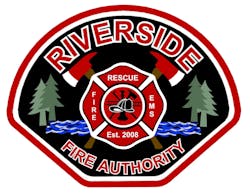WA Fire Authority Reconsiders Illegal Burn Response
Riverside Fire Authority is in the process of implementing a new policy that redefines situations where firefighters would step foot on property after allegations of an illegal burn.
RFA Chief Mike Kytta said the changes don’t apply to fires that are threatening property or people, but are rather intended for law enforcement to respond to calls of illegal burns that are still under control but violate the conditions of burning restrictions or bans.
“We’ve been working with a changing environment in the last few years, where wildfires have become more frequent in our area, and I think the public and the local governments are becoming more aware of that,” said Kytta, adding that recently, his department has started to consider the ways in which they respond to calls of illegal burns.
Now, he said, the department is in what he called an implementation process that would still see firefighters traveling to the address of a reported controlled burn but not entering the property if the fire doesn’t seem to constitute a true emergency or if the property owner doesn’t grant the firefighters permission to step foot on the property.
Typically, firefighters have no problem contacting the property owners, and explaining rules and conditions in place that make a fire illegal, such as when county authorities impose burning restrictions or all-out bans due to dry conditions.
“However, in recent years, we found that we are encountering individuals that at times do not welcome that information or do not welcome us on their property, and we have limitations on access of property,” Kytta said, adding that they’ve had people yell at and threaten firefighters who have gone onto property to take a look at an illegal controlled burn.
In a situation where the fire doesn’t represent an immediate threat, Kytta said the information will be referred to the proper law enforcement agency to take steps toward the proper disciplinary measures.
In situations where the fire isn’t visible from the roadway, he said they’ll work with law enforcement, likely waiting for officers or deputies to accompany them on the scene.
“I think this is still very much a work in process. And we’re trying to move carefully to make sure we don’t create too much confusion. … We are still responding to every notification that we receive the way we have in the past, we’ll be patient and work our way through this and be a good partner, and hopefully we have a cleaner, better outcome from this work,” said Kytta, saying that changes in policy are made with communication with other parties.
Steve Mansfield, director of Lewis County Emergency Management, said the changes that RFA is working toward coincide with discussions at the 911 Center and with Lewis County’s emergency departments to standardize the way dispatchers communicate and relay information to first responders when taking calls.
“Right now, all of our calls are dispatched in the manner prescribed by that fire district,” said Mansfield, meaning dispatchers might have different policies in communicating the same call type depending on the district the incident occurs.
“If you have one or two standardized ways for dispatching, let’s say a car fire, then that’s very different than having 18 different ways and things that you have to do for 18 different districts that are different. And you can see how quickly this thing could compound itself if you have several calls happening at the same time with all sorts of different non-standardized different responses,” he said.
Mansfield said Thursday that there have been 47 illegal burn calls so far in 2019. He said those calls typically don’t constitute a threat to property or people. Among the changes being discussed is for law or code enforcement to be the primary responding agency to such calls, with fire personnel being dispatched only when the fire represents a threat.
“What we’re trying to accomplish as a group of responders, is when we get a call that is determined to be an illegal burn as a result of the questions and information we have collected, and perhaps instead of calling all these fire departments or whatnot, what we’re looking at is it goes to the enforcement authority for violation of law,” he said.
The changes in RFA policy were addressed briefly in a meeting between the Lewis County Prosecutor’s Office and the Board of County Commissioners, where representatives from both offices said they had lingering questions about RFA implementing changes to their response policies.
Civil Deputy Prosecutor Eric Eisenberg said he felt that when burn restrictions are in place, it’s because conditions are such that a fire could potentially break out easily due to fire-prone conditions. Commissioner Bobby Jackson said his main concern was liability falling on the county. Both parties, however, said they would be interested in speaking with RFA leadership to better understand the policy changes.
“I respect Riverside Fire Authority, they’re an independent government agency, they set the policy they think is best. We try to work with them to carry out our mutual goals,” Eisenberg told The Chronicle.
Meanwhile, Mansfield said any changes made to dispatching policy would be made with careful consideration, and all necessary parties at the table. A summit has already been held with various stakeholders.
“If I can’t find a way to do this differently in a manner that doesn’t jeopardize our public safety service, we’ll keep doing it like we’re doing it. But I firmly believe with a little innovation and a little creativity and a little bit of work in understanding what everyone’s issues are surrounding this, we’re going to collectively make some changes that make a difference and help us meet that public safety mission we’re all obligated to,” Mansfield said.
———
©2019 The Chronicle (Centralia, Wash.)
Visit The Chronicle (Centralia, Wash.) at www.chronline.com
Distributed by Tribune Content Agency, LLC.
